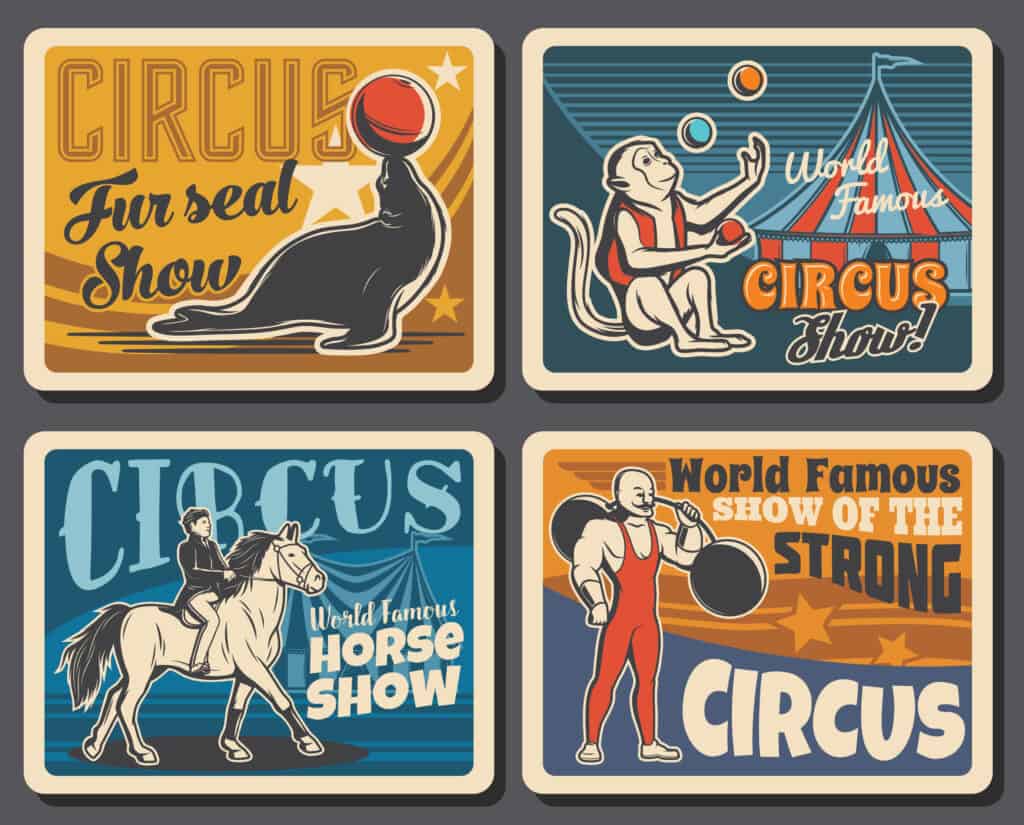When it comes to things that are not our concern, we often say, “not my circus, not my monkeys.” This catchy little phrase describes something we have no control over and do not want to be bothered with. So, where did this saying originate, and what does it mean? This phrase has some ambiguity in its origin; however, most can agree on its meanings. We explore the evolution of the phrase “not my circus, not my monkeys.”over time and possible real-life applications.
Possible Origins of, ‘Not My Circus, Not My Monkeys’

Not my circus not my monkeys – the phrase is thought to come from a Polish proverb, one with the same translation and another meaning that you don’t need to look after cows and horses on your property that don’t belong to you.
©iStock.com/seamartini
Some believe that Poland is the source of this catchy phrase. The saying is supposedly from a Polish proverb that goes, “Nie moje krowy, nie moje konie,” which translates to “It’s not my cows, it’s not my horses.” People initially used this proverb to describe themselves as not being responsible for caring for animals on their property. However, over time people started using the phrase to distance themselves from situations they deemed out of their control.
Another similar take on this phrase is “nie mój cyrk, nie moje małpy” in Polish, which literally translates to “not my circus, not my monkeys.” It has a specific meaning and a slightly different emphasis than what is commonly known. People use it to express frustration when someone does not take advice or when their attempt to remedy a problem fails. Essentially, it means “not my problem” with a hint of, “I told you so.”
Examples of Everyday Use
You can apply the saying “not my circus, not my monkeys” in many everyday scenarios like those below.
One example of how to use this phrase is when someone discusses a problem they are having with someone else. In this scenario, the person might say, “I don’t know what to do. It’s not my circus, not my monkeys,” to express that they are not responsible for the problem and that it is not their duty or responsibility to fix an issue.
You can also use this phrase to avoid involving yourself in a situation. For example, suppose you see two people fighting on the street. In that case, you might say, “not my circus, not my monkeys,” to avoid involving yourself in their altercation.
Also, people use this phrase to dismiss someone’s concerns. For example, suppose someone is talking to you about a problem they are having. In that case, you might say “not my circus, not my monkeys” to show that you have no interest in their issue.
Overall, the phrase “not my circus, not my monkeys” is useful when expressing that someone does not want to be responsible for something or wants no involvement in a situation.
What Is a Useful Way To Illustrate the Phrase – ‘Not My Circus?’

Not my circus, not my monkeys
©iStock.com/Tatiana Belova
This fictional scenario illustrates where you can apply the phrase to an everyday life situation:
I was a server for a few years, and one of my favorite sayings was, “Not my circus, not my monkeys.” It’s a great way to detach yourself from the drama that goes with restaurant life. I’ve used it to describe everything from customers angry about their food to co-workers gossiping about each other.
One situation that I remember is when I worked at a busy Italian restaurant. One of the cooks got into an argument with the dishwasher, which turned into a full-blown shouting match. It was honestly entertaining to watch, but I had to keep my head down and focus on my work. I didn’t want the aftereffects of involving myself in their drama at the time.
Later, when things had calmed down, I joked with the cook that it wasn’t my circus, not my monkeys. He laughed, and we went back to work. It was a great way to defuse the situation and maintain professionalism.
A Real-life Example From Reddit

Jack in the Box fast food chain restaurant. No matter the restaurant, diner, server, or monkey – we all have days when, ‘not my circus, not my monkey,’ applies.
©iStock.com/Melissa Kopka
Two years ago, an interesting post on Reddit received quite the attention when a server titled their post ‘Not My Circus, Not My Monkeys.’ In this post, the writer describes a scenario where he is asked to bring ranch dressing to the table that was not his own. He agrees but, due to a busy evening, forgets. He then receives angry and derogatory feedback from the diner as he passes by later. His response was an excellent example of the above saying:
“I told her I was deeply sorry and that this was unacceptable from a veteran server like me. I demanded she take whatever amount the transgression merited out of my tip.”
“B, b, but . . . You’re not my server . . .,” said the diner.
He replied, “Yeah! So, you know exactly how much this matters to me right now!”
What Are the Possible Pros and Cons?

Squirrel
Monkeys in a Bolivian forest – not my monkeys, not my circus!
©Lindadevolder assumed (based on copyright claims), CC BY-SA 3.0, via Wikimedia Commons – License
When it comes to the saying “not my circus, not my monkeys,” there are pros and cons to consider. On the one hand, this approach is seen as avoiding involvement in things that are not your own and that you cannot control. But on the other hand, this avoidance can be helpful in terms of maintaining peace of mind and avoiding stress.
On the other hand, by not getting involved in situations that do not concern you, you can miss out on valuable opportunities to help others or make a difference in the world. You may also feel isolated or left out if you do not become involved in certain situations. In the end, it is up to everyone to decide whether this approach is right for them.
Pros
- Remembering that we cannot control everything in our lives can be helpful.
- It can be freeing not to take on the problems or stress of others.
Cons
- It can lead to neglecting important issues or problems with which we could help.
- It can create a feeling of indifference or apathy towards others.
What Other Popular Proverb Involves Monkeys?

Another famous adage, originating in Japan, references the three wise monkeys.
©NLPD / CC BY 3.0 – License
A famous idiom that originated in Japan and became popular during the 17th century in a Shinto pictorial format also involved monkeys. Rather than referencing them directly, three monkeys were depicted in various forms of art, with one covering his eyes, one his ears, and one his mouth. The age-old adage that accompanied it was “see no evil, hear no evil, speak no evil.”
The origins of this adage can be found in an ancient Buddhist parable that recounts a teacher telling three student monkeys not to see, hear, or speak evil. Try as they might, the monkies fail to follow the strict advice. The moral of the tale is to make people aware of their surroundings and to refrain from turning a blind eye to bad things.
The photo featured at the top of this post is © iStock.com/stanciuc
Thank you for reading! Have some feedback for us? Contact the AZ Animals editorial team.






